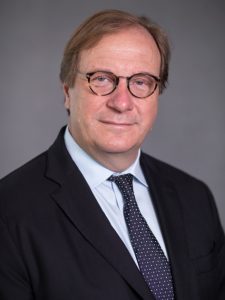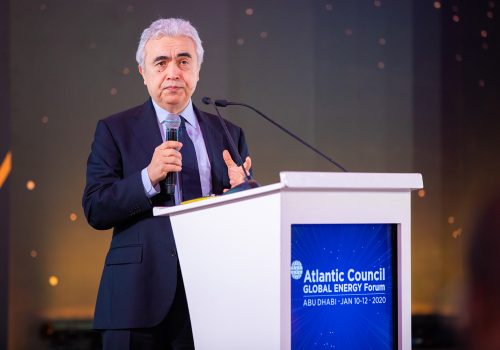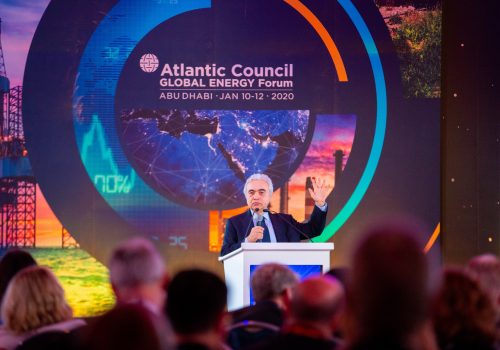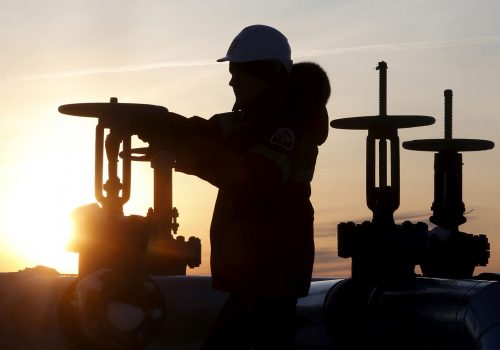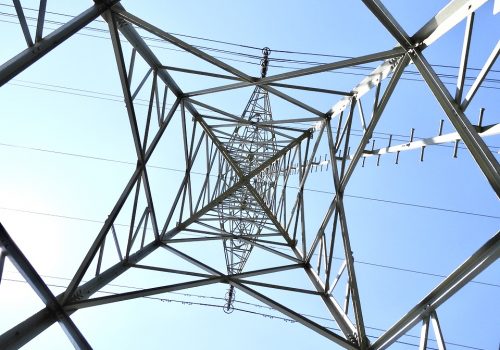COVID-19’s severe impact on oil prices and global supply chains has raised questions about the long-term implications of the pandemic for energy markets. As the virus continues to spread within and across borders, it leaves no energy market untouched, from coal and natural gas to wind and solar. The International Energy Agency (IEA) has emphasized the need for oil and gas producing countries to diversify their economies so as to navigate the plethora of uncertainties caused by unprecedented drops in demand for crude oil and refined products. IEA Executive Director Dr. Fatih Birol joins Atlantic Council President and CEO Fred Kempe for a virtual fireside chat on the future of energy markets in the face of the global COVID-19 pandemic.
Event recap
On Thursday, March 26, Dr. Fatih Birol, executive director of the International Energy Agency, joined Fred Kempe, Atlantic Council president and chief executive officer, for a virtual fireside chat on the COVID-19 pandemic, the Russian-Saudi oil price war, and the associated impacts on the global energy system.
The conversation kicked off with a focus on oil markets, the threats of increasing supply and dwindling demand serving as a centerpiece of discussion. With the initial outbreak of COVID-19 in China, oil prices have slumped as demand from industry, aviation, and other impacted sectors has fallen. As the virus spread, the demand outlook worsened, and the breakdown of the Russia-Saudi oil production agreement as well as the subsequent, unprecedented petroleum output in both countries has left the oil market searching for a price floor. Birol noted that the consequences of this price war will be especially devastating for smaller producers in the developing world like Nigeria, Iraq, Algeria that have poorly diversified economies.
During the the conversation, Kempe and several participants inquired about the implications of dwindling global oil storage amid historic increases in output and prolonged decline in demand. Demand for oil will continue to fall as the severity of the pandemic tightens its grip on the world; at some point soon, global petroleum storage will reach capacity, Birol noted. He highlighted the critical importance for smaller, independent oil producers to adapt to the evolving price environment and asserted that Saudi Arabia, often perceived as the central oil market stabilizer, should reevaluate its production strategy as global demand plummets.
And beyond the oil market, Birol discussed current and prospective trends in electricity demand and underscored the importance of electricity security and grid resilience. Stressing the need for a reliable, consistent power supply, Birol emphasized that when considering new investment in renewables, base-load energy sources such as hydroelectric, geothermal, and nuclear power must factor into the financing strategy. Birol affirmed that the coronavirus crisis will serve as an inflection point for the energy transition. As governments roll out and implement stimulus packages across the world, Birol underlined that sustainable investment and climate action must remain top priorities.
Featuring
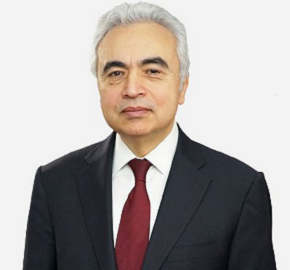
Dr. Fatih Birol has served as executive director of the International Energy Agency (IEA) since September 2015. Under his leadership, the IEA has undertaken its first comprehensive modernization program since its creation in 1974. This effort focuses on including major emerging countries who have joined the IEA, broadening the IEA’s security mandate to natural gas and electricity as well as oil, and making the IEA the global hub for clean energy technologies and energy efficiency. Prior to his current position, Dr. Birol spent over twenty years at the IEA, rising through the ranks to the position of chief economist, responsible for the flagship World Energy Outlook publication. He is also the founder and chair of the IEA Energy Business Council, one of the world’s most active industry advisory groups in energy. Dr. Birol chairs the World Economic Forum’s (Davos) Energy Advisory Board and serves on the United Nations Secretary-General’s Advisory Board on ‘Sustainable Energy for All’. He is the recipient of numerous awards, including the Japanese Emperor’s Order of the Rising Sun, the Order of the Polar Star from the king of Sweden and the highest presidential decorations from Austria, Germany and Italy. Before the IEA, Dr. Birol worked at the Organization of the Petroleum Exporting Countries (OPEC) in Vienna. He earned a bachelor’s degree in power engineering from the Technical University of Istanbul and receive a master’s degree and PhD in energy economics from the Technical University of Vienna. Dr. Birol was awarded a Doctorate of Science honoris causa from Imperial College London in 2013.
Moderated by
Related content
Learn more about the Global Energy Center

The Global Energy Center develops and promotes pragmatic and nonpartisan policy solutions designed to advance global energy security, enhance economic opportunity, and accelerate pathways to net-zero emissions.
